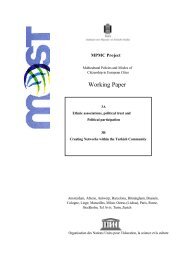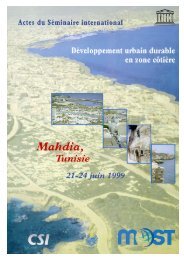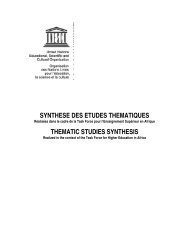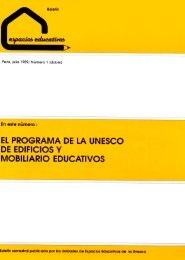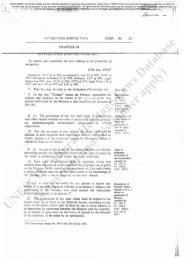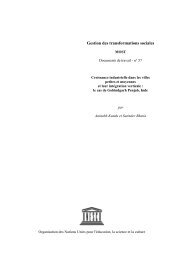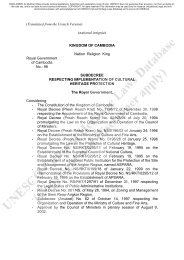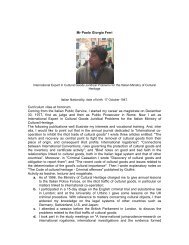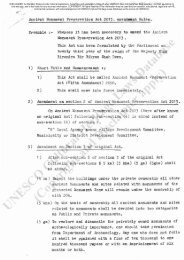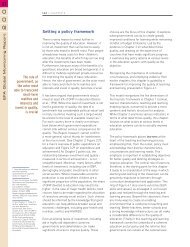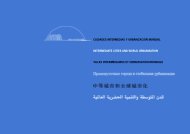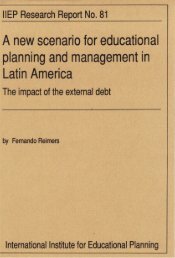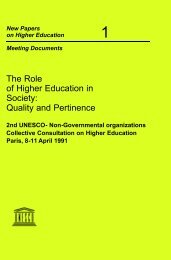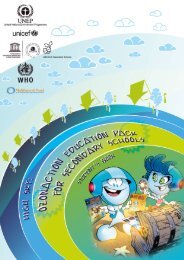Chapter 2. Progress towards the EFA goals - Unesco
Chapter 2. Progress towards the EFA goals - Unesco
Chapter 2. Progress towards the EFA goals - Unesco
Create successful ePaper yourself
Turn your PDF publications into a flip-book with our unique Google optimized e-Paper software.
0<br />
1<br />
0<br />
CHAPTER 2<br />
2<br />
Education for All Global Monitoring Report<br />
Literacy remains<br />
among <strong>the</strong> most<br />
neglected of all<br />
education <strong>goals</strong><br />
30. The target of achieving<br />
a 50% improvement in<br />
levels of adult literacy<br />
is measured by looking<br />
at <strong>the</strong> illiteracy rate,<br />
reflecting <strong>the</strong> original<br />
formulation of <strong>the</strong> goal as<br />
expressed in Jomtien in<br />
1990. The adult illiteracy<br />
rate is computed by<br />
deducting <strong>the</strong> adult<br />
literacy rate from 100.<br />
Youth and adult literacy<br />
Goal 4: Achieving a 50 per cent improvement<br />
in levels of adult literacy by 2015, especially<br />
for women, and equitable access to basic<br />
and continuing education for all adults.<br />
Youth and adult illiteracy is <strong>the</strong> price people<br />
and countries are paying for <strong>the</strong> past failures of<br />
education systems. When people emerge from <strong>the</strong>ir<br />
school years lacking basic reading, writing and<br />
numeracy skills, <strong>the</strong>y face a lifetime of disadvantage<br />
as illiteracy diminishes <strong>the</strong>ir social and economic<br />
prospects and damages self-esteem. But <strong>the</strong><br />
consequences of illiteracy extend beyond <strong>the</strong><br />
individual. When people lack literacy, society as<br />
a whole suffers from lost opportunities for higher<br />
productivity, shared prosperity and political<br />
participation (Fasih, 2008; Kinsella and He, 2009;<br />
UIS, 2008a; UNESCO, 2005). Beyond <strong>the</strong> individual<br />
and social costs, illiteracy is a violation of human<br />
rights and a global blight on <strong>the</strong> human condition<br />
(Maddox, 2008; Oxenham, 2008). Eradicating it<br />
is one of <strong>the</strong> most urgent development challenges<br />
of <strong>the</strong> twenty-first century.<br />
The international community has failed to rise<br />
to <strong>the</strong> challenge. At <strong>the</strong> World Education Forum<br />
in Dakar in 2000, governments pledged to achieve a<br />
50% improvement in levels of adult literacy by 2015.<br />
The pledge was ambitious, but <strong>the</strong> target was<br />
achievable. Unfortunately, <strong>the</strong> goal will be missed<br />
by a large margin. In a world with 759 million<br />
illiterate young people and adults, <strong>the</strong>re has been<br />
a conspicuous lack of urgency and commitment<br />
to literacy on <strong>the</strong> part of political leaders. The many<br />
exceptions to <strong>the</strong> rule serve to demonstrate that<br />
far more could have been achieved – and that far<br />
more can be done to get closer to <strong>the</strong> 2015 target.<br />
Among <strong>the</strong> key messages of this section:<br />
Literacy remains among <strong>the</strong> most neglected<br />
of all education <strong>goals</strong>. <strong>Progress</strong> <strong>towards</strong> <strong>the</strong><br />
2015 target of halving illiteracy 30 has been far<br />
too slow and uneven. With half <strong>the</strong> period for<br />
achieving <strong>the</strong> target having elapsed, <strong>the</strong> regions<br />
far<strong>the</strong>st behind have travelled between a half and<br />
two-thirds of <strong>the</strong> distance required. On current<br />
trends, <strong>the</strong>re will be 710 million illiterate adults<br />
worldwide in 2015. The evidence from monitoring<br />
is clear: unless far more is done to accelerate<br />
progress, <strong>the</strong> 2015 targets will not be reached.<br />
More rapid progress remains possible. Several<br />
countries have demonstrated through successful<br />
policies that more rapid advance <strong>towards</strong> adult<br />
literacy is possible. The National Literacy Mission<br />
in India and <strong>the</strong> Literate Brazil Programme<br />
(Programa Brasil Alfabetizado) both reflect a<br />
stronger commitment to literacy by political<br />
leaders. Several countries have developed highly<br />
innovative programmes through partnerships<br />
linking communities to governments and<br />
non-government groups. Better financing and<br />
a renewed effort to reach older adults are<br />
critical to accelerated progress.<br />
Far more has to be done to overcome <strong>the</strong> legacy<br />
of disadvantage in literacy. While gender gaps<br />
are narrowing, <strong>the</strong>y remain very large – women<br />
still account for nearly two-thirds of <strong>the</strong> world’s<br />
adult illiterates. Failure to tackle gender<br />
disparities and wider inequalities based on<br />
wealth, region, ethnicity and language are<br />
holding back progress.<br />
This section is divided into two parts. Part 1<br />
provides a global overview of literacy and a post-<br />
Dakar progress report. It also looks ahead to 2015,<br />
providing a projection of where current trends will<br />
leave <strong>the</strong> world in relation to <strong>the</strong> goal of achieving<br />
a 50% improvement in levels of adult literacy.<br />
Part 2 looks at some of <strong>the</strong> countries that are<br />
making progress and identifies approaches that<br />
are making a difference.<br />
<strong>Progress</strong> since <strong>the</strong> Dakar forum<br />
The precise meaning of ‘literacy’ continues to be<br />
subject to intense academic debate (Benavot, 2008;<br />
Fransman, 2005). Unlike <strong>the</strong> simple dichotomies<br />
used in o<strong>the</strong>r areas – such as being ‘in school’ or<br />
‘out of school’ – <strong>the</strong>re are no clear-cut dividing lines<br />
between <strong>the</strong> literate and non-literate. In any society,<br />
<strong>the</strong>re is a continuum of literacy – and people with<br />
a fragile hold on literacy in youth can lose that hold<br />
in adulthood. However, academic debates over<br />
<strong>the</strong> precise meaning of <strong>the</strong> word should not detract<br />
from common-sense depictions of what <strong>the</strong><br />
experience of illiteracy means to those affected.<br />
Half a century ago, UNESCO defined a literate<br />
person as someone ‘who can with understanding<br />
both read and write a short simple statement on<br />
his or her everyday life’ (UNESCO, 1958, p. 3).<br />
More recently, <strong>the</strong> Global Campaign for Education<br />
has extended this basic idea: ‘Literacy is about<br />
<strong>the</strong> acquisition and use of reading, writing and<br />
94



